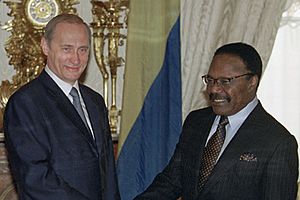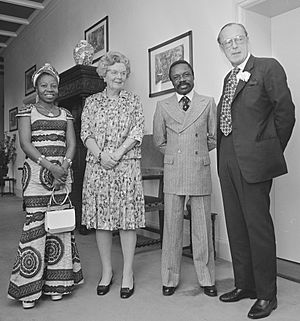Omar Bongo facts for kids
Quick facts for kids
Omar Bongo
|
|
|---|---|
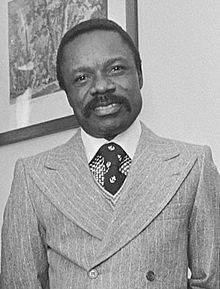
Bongo in 1973
|
|
| President of Gabon | |
| In office 2 December 1967 – 8 June 2009 |
|
| Prime Minister | Léon Mébiame Casimir Oyé-Mba Paulin Obame-Nguema Jean-François Ntoutoume Emane Jean Eyeghe Ndong |
| Vice President | Léon Mébiame Didjob Divungi Di Ndinge |
| Preceded by | Léon M'ba (as President) |
| Succeeded by | Ali Bongo Ondimba |
| 2nd Vice-President of Gabon | |
| In office 12 November 1966 – 2 December 1967 |
|
| President | Léon M'ba |
| Preceded by | Paul-Marie Yembit |
| Succeeded by | Léon Mébiame |
| Personal details | |
| Born |
Albert-Bernard Bongo
30 December 1935 Lewai, French Equatorial Africa (now Bongoville, Gabon) |
| Died | 8 June 2009 (aged 73) Barcelona, Spain |
| Political party | Democratic Party |
| Spouses | Louise Mouyabi Moukala (1957–1959) Patience Dabany (1959–1987) Edith Lucie Bongo (1989–2009) |
| Children | 30+ (by various partners), including Ali Bongo Ondimba |
| Military service | |
| Allegiance | |
| Branch/service | French Air Force |
| Rank | Captain |
El Hadj Omar Bongo Ondimba (born Albert-Bernard Bongo; 30 December 1935 – 8 June 2009) was a very important leader in Gabon. He was the second President of Gabon for a long time. He served for 42 years, from 1967 until he passed away in 2009.
Omar Bongo started in key government jobs when he was young. He worked under Gabon's first President, Léon M'ba, in the 1960s. In 1966, he became Vice-President. When President M'ba died in 1967, Omar Bongo became the new President.
For many years, Bongo led Gabon as a one-party state. This meant only his party, the Gabonese Democratic Party (PDG), was allowed. But in 1990, people wanted more choices. So, he allowed other political parties to exist. Even with strong opposition, he managed to stay in power. He often brought opposition leaders to his side. He won elections in 1993, 1998, and 2005. After Fidel Castro left power in 2008, Bongo became the world's longest-serving non-royal leader.
Some people criticized Bongo. They said he focused on himself, his family, and close friends. They felt he did not do enough for all of Gabon's people. For example, despite Gabon having a lot of oil money, there were not many new roads. Also, many babies still died young in 2009.
After Bongo's death in June 2009, his son, Ali Bongo Ondimba, became president. His son had held important government jobs before.
Contents
Early Life and Career
Albert-Bernard Bongo was born on December 30, 1935. He was the youngest of twelve children. His hometown was Lewai, which is now called Bongoville in Gabon. He belonged to the small Bateke ethnic group.
After finishing school, Bongo worked for the Post and Telecommunications. Then, he joined the French military. He served in the Air Force as a second lieutenant and then a first lieutenant. He was honorably discharged as a captain. In 1973, he changed his name to El Hadj Omar Bongo. This happened when he converted to Islam.
Political Journey
Starting in Government
After Gabon became independent in 1960, Albert-Bernard Bongo started his political career. He quickly moved up in different jobs under President Léon M'ba. In 1962, he became the Assistant Director of the President's office. Seven months later, he became the Director.
In 1964, there was a brief attempt to take over the government. President M'ba was taken, and Bongo was held in a military camp. But M'ba was back in power just two days later.
In 1965, Bongo was put in charge of defense and coordination. He then became the Minister of Information and Tourism. President M'ba's health was not good. So, he chose Bongo to be Vice-President of Gabon in November 1966. In the 1967 election, M'ba was re-elected President, and Bongo was elected Vice-President. Bongo was already largely in charge of Gabon since late 1966.
Leading a Single-Party State
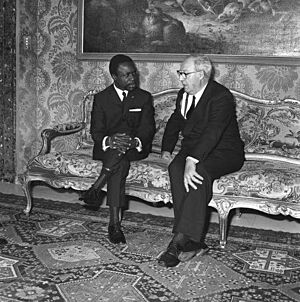
Omar Bongo became President on December 2, 1967. He was 32 years old. In March 1968, Bongo made Gabon a one-party state. This meant only his party, the Gabonese Democratic Party (PDG), was allowed. In the 1973 elections, Bongo was the only candidate for president. He and all PDG candidates won with almost all the votes.
In 1975, Bongo removed the Vice-President position. He made his former Vice-President, Léon Mébiame, the Prime Minister. Bongo himself held many important government jobs at the same time. These included Minister of Defense and Minister of Information. In 1979, he gave up some of these jobs to the Prime Minister. Bongo was re-elected for a seven-year term in 1979.
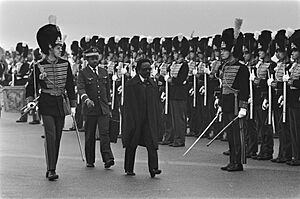
People started to oppose President Bongo's rule in the late 1970s. This was because of economic problems in Gabon. An illegal opposition group called MORENA formed. They organized student protests in 1981. MORENA accused Bongo of corruption and favoring his own tribe. They wanted Gabon to have many political parties again. Some MORENA members were arrested and sent to prison. But they were all released by 1986.
Despite these challenges, Omar Bongo kept Gabon as a one-party state. In 1985, elections were held where only PDG candidates were allowed. Bongo was re-elected in 1986 with almost all the votes.
Moving to Multi-Party Politics
In May 1990, there were strikes and protests in Gabon. Because of this, the government agreed to allow many political parties. The President's term was changed to five years, with a limit of one re-election.
The next day, a leading opposition leader, Joseph Rendjambe, died. This caused big riots. Government buildings were set on fire. French troops helped evacuate foreigners. France also sent more soldiers to Gabon. Bongo threatened oil companies that had cut production.
In December 1993, Bongo won the first multi-party presidential election. He won by a small margin. Opposition candidates did not accept the results. This led to more unrest. Talks between the government and opposition led to the Paris Accords in 1994. This agreement brought some opposition figures into the government. But this arrangement did not last long.
Bongo was able to get back control. Many opposition leaders were given high jobs in the government or bought off. This helped him win the 1998 election easily.
In 2003, Bongo changed the Constitution again. This allowed him to run for president as many times as he wanted. It also changed the presidential term to seven years. Critics said he wanted to rule for life. On November 27, 2005, Bongo won another seven-year term. He received 79.2 percent of the votes. He remained president until his death in 2009.
Gabon's Ties with France
Bongo's international relations were mostly about Gabon's ties with France. Gabon was very important to France. It had oil, uranium, iron, manganese, and timber. Bongo once said, "Gabon without France is like a car with no driver. France without Gabon is like a car with no fuel."
In 1964, when soldiers tried to take over the government, French paratroopers helped rescue President M'ba and Bongo. They put them back in power. Bongo became Vice President in 1966 after being approved by French President Charles de Gaulle.
France provided a lot of aid to Gabon. This included money for Gabon's budget and loans. France also paid salaries for French advisors and teachers in Gabon. France kept a military base in Gabon. In 1990, France helped Bongo stay in power during protests. When Gabon was close to a civil war in 1993, Paris hosted talks between Bongo and the opposition. This led to an agreement that brought peace.
Some French politicians claimed that Bongo helped fund French election campaigns. After Bongo passed away, French President Nicolas Sarkozy expressed sadness. He said France would remain a friend to Gabon.
Concerns About Wealth
Omar Bongo became very wealthy during his time as president. His wealth came mostly from Gabon's oil money. In 1999, a US Senate investigation looked into his bank accounts. It found that he held a large amount of money. The report said this money came from Gabon's public funds.
In 2005, an investigation showed that a lobbyist offered to arrange a meeting between Bongo and US President George W. Bush. This meeting would cost a lot of money. Bush did meet with Bongo later.
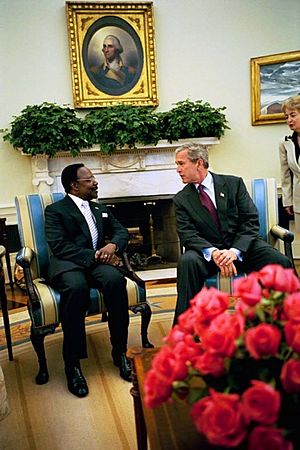
In 2007, Bongo's former daughter-in-law appeared on a TV show. She was trying to buy a very expensive house in California.
Bongo was also mentioned in French investigations. These investigations looked into large payments made by a French oil company. One company representative said they gave money to Bongo each year to use Gabon's oil lands. French groups also claimed that Bongo used public money to buy expensive properties in France. Bongo denied any wrongdoing.
In 2009, Bongo had a disagreement with France over these investigations. A French court froze his bank accounts. His government said France was trying to destabilize Gabon. This is why he was hospitalized in Spain, not France, during his last days.
How Bongo Led Gabon
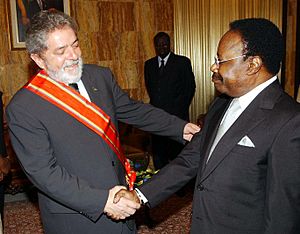
Omar Bongo was seen as one of Africa's "Big Man" rulers. He was described as a small, well-dressed man who spoke perfect French. He was a charismatic leader. His long rule was supported by France, Gabon's oil money, and his political skills.
Bongo made a deal with France. He gave a French oil company special rights to Gabon's oil. In return, France helped him stay in power.
Bongo oversaw a period of great oil wealth. This wealth allowed him and his family to live a very lavish lifestyle. They owned many luxurious properties in France and had an expensive presidential palace in Gabon. He became one of the richest people in the world. He made sure that some oil money reached the people of Gabon. This helped prevent large protests. He built some basic roads and a railway line. Oil money also paid for many government jobs. This helped spread wealth among the people.
Bongo used some of the money to build a group of supporters. These included government ministers and army officers. He learned to give government jobs to different tribal groups. This way, every important group had someone in the government. Bongo was good at convincing critics to become his allies. He offered them a share of the country's oil wealth. He preferred to win over opponents rather than crush them. He became very successful among African leaders.
When multi-party elections were held in 1993, Bongo won. But there were claims of cheating. The opposition said their leader was robbed of victory. Gabon was close to a civil war. Bongo decided to talk with the opposition. These talks led to the Paris Agreement, which brought peace. When Bongo won the 1998 elections, there were similar arguments. He met with critics to discuss making elections fairer. After his party won many seats in 2001, Bongo offered government jobs to important opposition members. One opposition leader accepted a job.
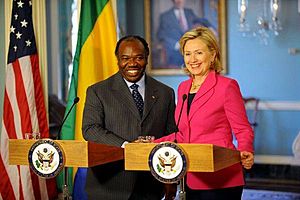
Another main opposition leader, Pierre Mamboundou, refused to join Bongo's government. He called for people to boycott the 2001 elections. His supporters even burned ballot boxes. But Bongo never arrested him. Bongo said that "forgiveness" was his "best revenge." Later, Mamboundou stopped criticizing Bongo. It was reported that Bongo promised him a large sum of money for his hometown.
As time went on, Bongo relied more on his close family. By 2009, his son Ali was the Minister of Defense. His daughter, Pascaline, led the President's office. Her husband was the Minister of Foreign Affairs.
In 2000, Bongo ended a student strike. He provided money for computers and books that students wanted. He was also known for loving nature. In 2002, he set aside 10 percent of Gabon's land as national parks. He promised these areas would never be logged or mined. Many places in Gabon were named after him, like Bongo University and Bongo Airport. His hometown, Lewai, was renamed Bongoville.
On the world stage, Bongo was known as a mediator. He helped try to solve problems in other African countries. In 1986, he received a peace prize for his efforts. He was popular in Gabon because his rule brought peace and stability. However, some experts say that despite the oil money, Gabon's wealth mostly benefited the ruling class. This did not greatly improve life for most people.
Family Life
Bongo converted to Islam in 1973 during a visit to Libya. He took the name Omar. In Gabon, Muslims were a small group, but their numbers grew after his conversion. In 2003, he added Ondimba to his name to honor his father.
Bongo's first wife was Louise Mouyabi-Moukala. They had a daughter named Pascaline in 1957. Pascaline later became Gabon's Foreign Minister.
His second marriage was to Marie Josephine Kama. They divorced in 1987. She then started a music career as Patience Dabany. They had a son, Alain Bernard Bongo, and a daughter. Alain Bernard Bongo later became Ali-Ben Bongo. He served as Foreign Minister and then Defense Minister. In 2009, he was elected President after his father's death.
Bongo then married Edith Lucie Sassou-Nguesso in 1989. She was almost 30 years younger than him. She was the daughter of the President of the Republic of the Congo. Edith Lucie Bongo was a doctor and worked to fight AIDS. They had two children together. Edith Lucie Bongo passed away on March 14, 2009, in Morocco. She had been receiving medical treatment there. She was buried in her home country, Congo.
Omar Bongo had more than 30 children with his wives and other partners.
Illness and Passing
On May 7, 2009, Gabon's government announced that Bongo had paused his duties. They said he was resting in Spain after his wife's death.
However, international news reported that he was very ill. They said he was being treated for cancer in a hospital in Barcelona, Spain. The Gabonese government first said he was just resting. But they later admitted he was having a medical check-up in Spain.
On June 7, 2009, some reports said Bongo had died from complications of advanced cancer. The Gabonese government denied these reports. They kept saying he was well. His death was finally confirmed by Gabon's Prime Minister. He said Bongo died of a heart attack on June 8, 2009.
Bongo's body was brought back to Gabon. Thousands of people came to pay their respects. A large state funeral was held on June 16, 2009, in Libreville. Many African leaders attended, along with French presidents Nicolas Sarkozy and Jacques Chirac.
Bongo's body was then flown to Franceville. This is the main town in the area where he was born. He was buried in a private family burial on June 18, 2009.
See also
- Tokyo International Conference on African Development (TICAD-IV), 2008.
 In Spanish: Omar Bongo para niños
In Spanish: Omar Bongo para niños


